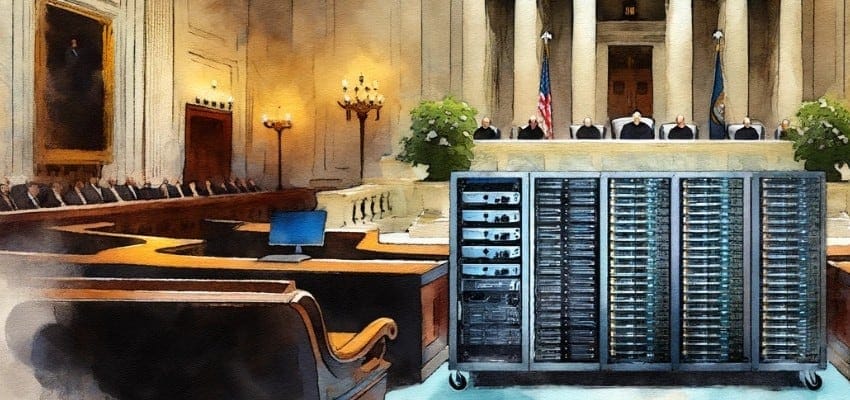AI Tools for Judges

"I predict that human judges will be around for a while. But with equal confidence I predict that judicial work—particularly at the trial level—will be significantly affected by AI." — Chief Justice John G. Roberts, Jr.
[ This article originally appeared on Complex Discovery. It has been republished here with permission. ]
By Rob Feigenbaum and Giel Stein[1]
In his 2023 Year-End Report on the Federal Judiciary, Chief Justice Roberts recognized that artificial intelligence (“AI”) will have a dramatic effect on how litigation is conducted. “Rule 1 of the Federal Rules of Civil Procedure directs the parties and the courts to seek the ‘just, speedy, and inexpensive’ resolution of cases. Many AI applications indisputably assist the judicial system in advancing those goals. . . I predict that human judges will be around for a while. But with equal confidence I predict that judicial work—particularly at the trial level—will be significantly affected by AI. Those changes will involve not only how judges go about doing their job, but also how they understand the role that AI plays in the cases that come before them.” Chief Justice John G. Roberts, Jr., 2023 Year-End Report on the Federal Judiciary (December 31, 2023), p. 6.
Justice Roberts’ prediction was correct. New technology platforms for court reporting have recently emerged to help judges improve their efficiency with AI. The new technology platforms provide electronic tools which enable judges to access, search and quote testimony from depositions and hearings, without having to spend time hunting in disparate places throughout the record for paper copies of transcripts, or using cumbersome word listings at the end of deposition transcripts, when considering and writing their opinions. See, e.g., www.prevail.ai. More specifically, the new technology platforms enable judges to be more efficient by: helping them identify the most relevant testimony, including potential conflicts with previous testimony and documents; tracking the testimony that relates to key issues in the case; and creating summaries of testimony by witness and/or topic or question, with links to the actual testimony. These tools will help judges in preparing their opinions, and will reduce unnecessary burdens imposed on judges’ time from the lack of modern technology to do their work.
The new technology platforms are SOC-2-Type 2 and ISO 27001 compliant; they cost a relatively small amount compared to the cost of preparing the transcript of a deposition or hearing; and they assure that the parties’ data and testimony (1) are always stored in, and never leave, a secure cloud-based environment, (2) can be encrypted for use in transmission and storage, and (3) can be subject to regular third-party security audits, including penetration testing. See Rob Feigenbaum, Geoffrey Vance and Patrick Zeller, Solving the Problem of Information Security in Court Reporting, Complex Discovery (January 16, 2024), https://complexdiscovery.com/solving-the-problem-of-information-security-in-court-reporting/.
The new technology platforms do not raise significant concerns about invading privacy interests, dehumanizing the law, hallucination, compromise of legal privileges, due process, reliability or potential bias. See Chief Justice Roberts, at pp. 5-7. Rather, like advances in legal research technologies which in the 1980s gave judges the ability to access cases on their computers rather than have to “pull” them from hardbound case reporters, Id. at 4, the new technology platforms simply give judges the ability quickly to identify and consolidate the most important testimony in the case when they are forming and writing their opinions. The judges exercise their own judgment and decide what testimony is important, and what should go into the opinions. Similarly, as litigators use the new technology platforms to take and conduct depositions, and participate in hearings, in 2024 and beyond, the litigators will exercise their own judgment and decide what testimony is important, and should be discussed in a pleading, deposition or hearing. This will assure compliance with the governing legal and ethical rules for litigators. See, e.g., FRCP 11(b) and 26(g); ABA Model Rules 1.1, 2.1, 1.6(a) and (c), and 3.3.
Like Chief Justice Roberts, the Federal Judicial Center (“FJC”), the National Center for State Courts (“NCSC”) and other organizations focused on judicial education recognized in 2023 the dramatic effect that AI will have on litigation. These organizations conducted excellent training for judges on the uses of AI. See, e.g., James E. Baker, Laurie N. Hobart and Matthew Mittelsteadt, An Introduction to Artificial Intelligence for Judges, Federal Judicial Center (2023), https://permanent.fdlp.gov/gpo195237/An_Introduction_to_Artificial_Intelligence_for_Federal_Judges.pdf; Shay Cleary, Preparing Your Court for AI, National Center for State Courts, MC-CoSC-Webinar3-ALJ-Revised2.pdf | Powered by Box.
To realize the great potential of the new technology platforms for court reporting in the courts, we respectfully offer the following modest suggestions. First, the judicial training on AI that occurs in 2024 and beyond should be expanded to include training on the new technology platforms for court reporting. Second, pilot projects of the new technology platforms should occur in federal and state courts in 2024, just as pilot projects of technology platforms for hybrid hearings were conducted in a variety of state courts through the NCSC’s Hybrid Hearings Initiative in 2022-23. See Hybrid Hearings Improvement Initiative | NCSC. Third, if deemed appropriate upon completion of the pilot projects, the new technology platforms should be deployed in the federal and state courts.
The use in the courts of the new technology platforms for court reporting will improve the efficiency of judges, and thereby enhance the administration of justice in the United States.
End Notes
[1] Rob Feigenbaum is the Co-Founder and CEO of Prevail Legal. Giel Stein is Partner at Clark Hill PLC. The authors would like to thank Ashish Prasad, Vice President and General Counsel of HaystackID, for his valuable assistance in preparing this article.

